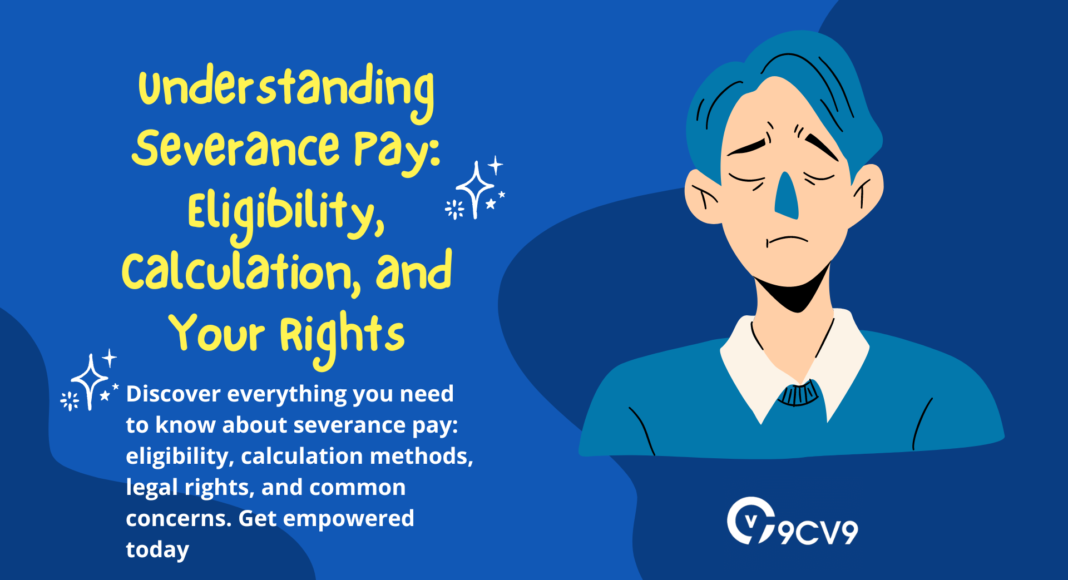Key Takeaways
- Know Your Rights: Understand the legal protections surrounding severance pay to ensure fair treatment during employment transitions.
- Calculate with Confidence: From flat amounts to length of service calculations, grasp the methods used to determine your severance package.
- Empower Yourself: Navigate eligibility criteria and common concerns surrounding severance pay to advocate for fair compensation and protect your interests.
In the ever-evolving landscape of employment, navigating the intricacies of compensation packages can be daunting. Among the most crucial yet often misunderstood components is severance pay.
Whether you’re an employee facing termination, an employer drafting policies, or simply curious about your rights, understanding severance pay is paramount.
Severance pay, in its essence, serves as a financial cushion during the transitional period following termination.
However, its eligibility criteria, calculation methods, and the legal framework surrounding it can vary significantly depending on jurisdiction and individual circumstances.
This guide aims to shed light on every facet of severance pay, empowering you with knowledge to make informed decisions and protect your interests.
Eligibility for severance pay is not universal.
It hinges on various factors, including employment duration, contractual agreements, and the reason for termination.
By delving into these intricacies, you’ll gain clarity on who qualifies for severance pay and under what circumstances.
Understanding eligibility criteria is the first step in ensuring you receive the compensation you deserve upon departure from your job.
Calculating severance pay is often a labyrinthine process, with numerous variables at play.
Whether it’s a flat amount, a calculation based on years of service, or a negotiated package, deciphering the method employed by your employer is crucial.
Moreover, factors such as salary, benefits, and company policies can significantly influence the final severance package amount.
Armed with insights into these considerations, you’ll be better equipped to assess the adequacy of your severance offer and negotiate effectively if needed.
Protecting your rights in the realm of severance pay involves navigating a complex web of legalities and negotiations.
Federal and state laws provide certain protections and guidelines, but understanding how they apply to your situation is paramount.
From ensuring compliance with statutory requirements to negotiating favorable terms, knowing your rights empowers you to safeguard your interests during a vulnerable period.
Throughout this guide, we’ll address common questions and concerns surrounding severance pay, such as the possibility of denial, tax implications, and effects on unemployment benefits.
Real-life case studies and examples will illuminate the principles discussed, providing practical insights into navigating severance pay scenarios.
In essence, understanding severance pay transcends mere financial considerations.
It’s about empowerment, protection, and the assurance that your rights are upheld in the face of career transitions.
So, whether you’re an employee, an employer, or simply someone seeking knowledge, join us on this journey to demystify severance pay and equip yourself with the tools to navigate the ever-changing landscape of employment with confidence.
Before we venture further into this article, we like to share who we are and what we do.
About 9cv9
9cv9 is a business tech startup based in Singapore and Asia, with a strong presence all over the world.
With over eight years of startup and business experience, and being highly involved in connecting with thousands of companies and startups, the 9cv9 team has listed some important learning points in this overview of Understanding Severance Pay: Eligibility, Calculation, and Your Rights.
If your company needs recruitment and headhunting services to hire top-quality employees, you can use 9cv9 headhunting and recruitment services to hire top talents and candidates. Find out more here, or send over an email to [email protected].
Or just post 1 free job posting here at 9cv9 Hiring Portal in under 10 minutes.
Understanding Severance Pay: Eligibility, Calculation, and Your Rights
- Eligibility for Severance Pay
- Calculating Severance Pay
- Understanding Your Rights
- Common Questions and Concerns
1. Eligibility for Severance Pay
Who Qualifies for Severance Pay?
- Employees Covered by Severance Pay Laws:
- Employees terminated without cause: In many jurisdictions, employees terminated without cause are entitled to severance pay as a form of financial assistance during the transitional period.
- Layoffs due to downsizing or restructuring: Companies undergoing layoffs or restructuring often provide severance packages to affected employees.
- Exceptions and Exclusions:
- Employees terminated for cause: In cases of misconduct or violation of company policies, severance pay may not be offered.
- Independent contractors: Independent contractors typically do not qualify for severance pay, as they are not considered employees.

Factors Influencing Eligibility
- Length of Employment:
- Employees with longer tenures generally receive higher severance packages. For example, an employee with 10 years of service may receive a more substantial severance package compared to someone with only 2 years of service.
- Reason for Termination:
- Employees terminated without cause are more likely to be eligible for severance pay. For instance, if a company undergoes a merger and lays off employees due to redundancy, those employees are usually entitled to severance pay.
- Employment Contract Terms:
- The terms outlined in an employment contract can significantly impact eligibility for severance pay. Contracts may specify conditions under which severance pay is provided, such as the minimum length of service required or the circumstances of termination.
Example: Eligibility Determination in a Corporate Layoff
- Scenario: A multinational corporation decides to downsize its workforce due to financial restructuring.
- Eligibility Criteria:
- Employees must have a minimum of one year of service to qualify for severance pay.
- Employees terminated for performance-related issues are not eligible.
- Severance pay is calculated based on years of service, with a maximum cap.
- Employee A:
- Has been with the company for 5 years.
- Is laid off due to the restructuring.
- Meets all eligibility criteria and is entitled to severance pay.
- Employee B:
- Has been with the company for only 6 months.
- Is terminated for consistently failing to meet performance targets.
- Does not meet the minimum length of service requirement and is ineligible for severance pay.
Summary
Understanding eligibility criteria is crucial for employees to determine their entitlement to severance pay. Factors such as length of employment, reason for termination, and contractual agreements play pivotal roles in determining eligibility.
By knowing these criteria, employees can assess their rights and entitlements in the event of termination.
2. Calculating Severance Pay
Methods of Calculation
- Flat Amount:
- In some cases, employers may offer a fixed amount of severance pay to all employees regardless of their tenure or salary level.
- For example, an employer may offer one week’s salary for every year of service as a flat severance pay amount.
- Length of Service:
- Many companies calculate severance pay based on the length of an employee’s service.
- The formula typically involves multiplying the employee’s weekly or monthly salary by the number of years or months worked.
- For instance, an employee earning $1,000 per week who has worked for 5 years may receive a severance package of $5,000 (5 years x $1,000/week).
- Negotiated Packages:
- Severance pay packages can be negotiated between employers and employees, especially in cases of voluntary resignation or retirement.
- Negotiated packages may include additional benefits such as extended health insurance coverage or career counseling services.
Factors Impacting Severance Package Amount
- Salary and Benefits:
- Severance pay is often based on an employee’s salary at the time of termination.
- Bonuses, commissions, and other benefits may also be factored into the calculation.
- For example, an employee with a higher salary and extensive benefits package may receive a larger severance package compared to a colleague with lower compensation.
- Company Policy:
- Some companies have established policies or guidelines for calculating severance pay.
- These policies may specify formulas or formulas based on factors such as years of service, position, or salary level.
- For instance, a company may have a policy of providing two weeks’ salary for every year of service as severance pay.
- Legal Requirements:
- Legal requirements, including federal, state, or local laws, may dictate the minimum severance pay that employers must provide.
- Employers are obligated to comply with these legal requirements when calculating severance pay.
- For example, some states have laws mandating a minimum amount of severance pay based on an employee’s length of service or the size of the employer.
Example: Calculation Method in a Tech Startup
- Scenario: A tech startup company decides to lay off a portion of its workforce due to financial constraints.
- Calculation Method:
- Employees are entitled to one week’s salary for every year of service.
- Additional benefits such as continued health insurance coverage for a certain period are included.
- Employee A:
- Weekly salary: $1,500
- Years of service: 3
- Severance pay calculation: $1,500/week x 3 years = $4,500
- Additional benefits: Health insurance coverage for 3 months.
- Employee B:
- Weekly salary: $2,500
- Years of service: 7
- Severance pay calculation: $2,500/week x 7 years = $17,500
- Additional benefits: Health insurance coverage for 6 months.
Summary
Calculating severance pay involves various methods, including flat amounts, length of service calculations, and negotiated packages.
Factors such as salary, company policy, and legal requirements impact the final severance package amount.
By understanding these factors and calculations, employees can assess the adequacy of their severance offers and negotiate effectively if needed.
3. Understanding Your Rights
Legal Protections for Severance Pay
- Federal Laws:
- The Worker Adjustment and Retraining Notification (WARN) Act requires certain employers to provide advance notice of mass layoffs or plant closings, which may include provisions for severance pay.
- The Fair Labor Standards Act (FLSA) does not require employers to provide severance pay, but if it is promised in an employment contract, employers must adhere to the terms.
- State Regulations:
- Some states have their own laws governing severance pay, which may include requirements for minimum severance amounts or eligibility criteria.
- For example, California requires employers to provide certain benefits, including severance pay, to employees terminated in a mass layoff, relocation, or termination of operations.
Negotiating Severance Packages
- Seeking Legal Counsel:
- Employees facing termination should consider seeking legal advice to understand their rights and options regarding severance pay.
- A lawyer specializing in employment law can review employment contracts, assess the adequacy of severance offers, and negotiate on behalf of the employee.
- Reviewing Employment Contracts:
- Employees should carefully review their employment contracts or any severance agreements they have signed.
- These documents may outline specific terms and conditions regarding severance pay, including eligibility criteria, calculation methods, and any conditions or limitations.
- Understanding Terms and Conditions:
- Employees should be aware of any conditions or restrictions attached to severance pay, such as non-compete agreements, confidentiality clauses, or release of claims.
- Understanding these terms ensures that employees make informed decisions when accepting severance packages.
Example: Legal Protections in a Mass Layoff Scenario
- Scenario: A manufacturing company undergoes a mass layoff due to financial difficulties.
- Legal Protections:
- Under the WARN Act, the company is required to provide 60 days’ notice to affected employees or pay them an equivalent amount of severance pay.
- State laws may require additional benefits or protections for employees affected by mass layoffs.
- Employee A:
- Receives 60 days’ notice of the layoff and is provided severance pay according to the terms outlined in the WARN Act.
- Employee B:
- Does not receive the required notice and is entitled to severance pay equivalent to 60 days’ wages.
Summary
Understanding your rights regarding severance pay is essential for protecting your interests during periods of employment transition.
Federal and state laws provide certain protections and guidelines, while negotiating severance packages can help employees secure fair compensation.
By seeking legal counsel, reviewing employment contracts, and understanding the terms and conditions attached to severance pay, employees can ensure that their rights are upheld in the event of termination.
4. Common Questions and Concerns
Can Severance Pay Be Denied?
- Reasons for Denial:
- Severance pay may be denied if an employee is terminated for cause, such as misconduct or violation of company policies.
- Employers may also choose not to offer severance pay if it is not required by law or if the company is facing financial constraints.
- Legal Protections:
- Certain laws, such as the WARN Act, may require employers to provide severance pay in specific situations, such as mass layoffs or plant closings.
- State laws may also provide additional protections for employees regarding severance pay eligibility.
Tax Implications of Severance Pay
- Taxation as Income:
- Severance pay is generally considered taxable income and is subject to federal, state, and local income taxes.
- Employers are required to withhold taxes from severance pay at the same rates as regular wages.
- Tax Withholding Options:
- Employees may have the option to have taxes withheld from their severance pay at a flat rate or based on their regular tax withholding allowances.
- Opting for a higher withholding rate can help avoid underpayment penalties when filing taxes.
Impact on Unemployment Benefits
- Effect on Eligibility:
- Severance pay may impact eligibility for unemployment benefits, as it is considered income.
- Depending on state regulations, receiving severance pay may result in a reduction or delay in unemployment benefits.
- Reporting Requirements:
- Employees receiving severance pay are typically required to report it when filing for unemployment benefits.
- Failure to report severance pay accurately may result in penalties or loss of benefits.
Recourse for Unfair Treatment
- Legal Remedies:
- Employees who believe they have been unfairly denied severance pay or treated improperly during the termination process may have legal recourse.
- Legal remedies may include filing a lawsuit for breach of contract, wrongful termination, or violation of employment laws.
- Documentation and Evidence:
- Employees should gather and preserve any documentation or evidence related to their termination and severance pay, including employment contracts, termination notices, and communications with employers.
- This documentation can be crucial in supporting a legal claim or negotiating a favorable resolution.
Example: Impact on Unemployment Benefits
- Scenario: An employee receives a severance package after being laid off from their job.
- Effect on Unemployment Benefits:
- The employee must report the severance pay when filing for unemployment benefits.
- Depending on state regulations, the severance pay may result in a reduction or delay in unemployment benefits.
- Example Outcome:
- The employee receives a severance package equivalent to three months’ salary.
- When filing for unemployment benefits, the employee reports the severance pay.
- As a result, the employee’s unemployment benefits are reduced for the duration covered by the severance pay.
Summary
Common questions and concerns regarding severance pay encompass various aspects, including eligibility, taxation, impact on unemployment benefits, and recourse for unfair treatment.
Understanding these considerations empowers employees to navigate the complexities of severance pay effectively and advocate for their rights during employment transitions.
By addressing these common questions and concerns, employees can make informed decisions and take appropriate actions to protect their interests.
Conclusion
Navigating the landscape of severance pay is a critical aspect of managing career transitions, whether as an employee facing termination, an employer implementing layoffs, or a curious observer seeking knowledge.
Throughout this comprehensive guide, we have delved into the intricacies of severance pay, covering eligibility criteria, calculation methods, legal protections, and common questions and concerns.
Understanding eligibility criteria is fundamental to determining entitlement to severance pay. Factors such as length of employment, reason for termination, and contractual agreements play pivotal roles in assessing eligibility.
By grasping these criteria, individuals can advocate for their rights and ensure fair treatment during the termination process.
Calculation methods for severance pay vary widely, ranging from flat amounts to formulas based on years of service and salary levels.
Factors such as salary, company policy, and legal requirements influence the final severance package amount. Armed with knowledge of these factors, individuals can assess the adequacy of severance offers and negotiate effectively if needed.
Legal protections for severance pay provide a safety net for employees, ensuring compliance with federal, state, and local laws.
Understanding these legal protections empowers individuals to assert their rights and seek recourse in cases of unfair treatment or wrongful denial of severance pay.
Common questions and concerns surrounding severance pay, such as taxation, impact on unemployment benefits, and recourse for unfair treatment, are addressed to provide clarity and guidance.
By addressing these concerns, individuals can make informed decisions and navigate the complexities of severance pay with confidence.
In essence, understanding severance pay transcends mere financial considerations. It’s about empowerment, protection, and the assurance that your rights are upheld during periods of employment transition.
Whether you’re an employee, an employer, or simply seeking knowledge, this guide equips you with the tools to navigate severance pay issues effectively and ensure fair treatment in the ever-changing landscape of employment.
By understanding eligibility criteria, calculation methods, legal protections, and common questions and concerns, individuals can navigate severance pay issues effectively and ensure fair treatment during employment transitions.
Armed with knowledge and awareness, you can confidently navigate the complexities of severance pay and protect your rights in the ever-evolving world of employment.
If your company needs HR, hiring, or corporate services, you can use 9cv9 hiring and recruitment services. Book a consultation slot here, or send over an email to [email protected].
If you find this article useful, why not share it with your hiring manager and C-level suite friends and also leave a nice comment below?
We, at the 9cv9 Research Team, strive to bring the latest and most meaningful data, guides, and statistics to your doorstep.
To get access to top-quality guides, click over to 9cv9 Blog.
People Also Ask
How is severance pay calculated?
Severance pay calculation methods vary but often include factors like length of service and salary level.
Can I negotiate my severance package?
Yes, negotiating severance packages is common, especially for high-level employees or in cases of voluntary resignation.
What happens if I’m terminated for cause?
Employees terminated for cause, such as misconduct, may not be eligible for severance pay.
Are there legal protections for severance pay?
Yes, federal and state laws provide certain protections and guidelines regarding severance pay.
What is the WARN Act?
The Worker Adjustment and Retraining Notification (WARN) Act requires employers to provide notice of mass layoffs or plant closings, which may include severance pay provisions.
How does severance pay affect unemployment benefits?
Severance pay may impact eligibility for unemployment benefits, as it is considered income and may result in reduced or delayed benefits.
What should I do if my employer denies severance pay?
If you believe you are entitled to severance pay and your employer denies it, consider seeking legal advice to explore your options.
What if I have a non-compete agreement in my severance package?
Review the terms of any non-compete agreements carefully, as they may impact your ability to seek new employment after termination.
Can I receive severance pay if I resign voluntarily?
Some employers offer severance pay to employees who resign voluntarily, especially in cases of retirement or buyout programs.
Is severance pay taxable?
Yes, severance pay is generally considered taxable income and is subject to federal, state, and local income taxes.
How can I calculate my severance pay?
You can calculate severance pay by multiplying your weekly or monthly salary by the number of years or months worked.
What happens if my employer goes bankrupt?
If your employer goes bankrupt, you may still be entitled to severance pay, depending on the circumstances and legal requirements.
Does severance pay include benefits?
Severance pay may include benefits such as continued health insurance coverage or outplacement services, depending on the employer’s policies.
What if my employment contract doesn’t mention severance pay?
If your employment contract does not address severance pay, you may still be entitled to it under state or federal laws or company policies.
Can I receive severance pay if I’m laid off due to COVID-19?
Many companies offer severance pay to employees laid off due to COVID-19, but eligibility may vary depending on the employer’s policies and government regulations.
What if I’m laid off while on maternity leave?
Laid-off employees on maternity leave are typically entitled to the same severance benefits as other employees, but it’s essential to review company policies and legal requirements.
How long does it take to receive severance pay after termination?
The timing of severance pay varies by employer and may be outlined in company policies or employment contracts.
What if I signed a severance agreement but changed my mind?
If you signed a severance agreement but changed your mind, you should consult with an attorney to understand your options and any potential consequences.
Can I still receive severance pay if I file a lawsuit against my employer?
The impact of filing a lawsuit on your eligibility for severance pay depends on the terms of any agreements you’ve signed and the outcome of the lawsuit.
Do independent contractors receive severance pay?
Independent contractors typically do not receive severance pay, as they are not considered employees of the company.
What if my employer offers a buyout instead of severance pay?
A buyout offer may include a lump-sum payment or other incentives in exchange for voluntarily resigning, which may or may not include traditional severance pay.
Is severance pay required by law?
Severance pay is not required by federal law in most cases, but some states have laws mandating severance pay under certain circumstances.
Can I still receive severance pay if I’m laid off without notice?
If you are laid off without notice, you may still be entitled to severance pay under the terms of your employment contract or state laws.
What if I disagree with the amount of severance pay offered?
If you disagree with the amount of severance pay offered, you can negotiate with your employer or seek legal advice to explore your options.
What if my employer refuses to provide a severance package?
If your employer refuses to provide a severance package, you may have legal options depending on the circumstances of your termination and applicable laws.
What if my employer offers a severance package, but it’s insufficient?
If you believe the severance package offered by your employer is insufficient, you can negotiate for a better offer or seek legal advice to explore your options.
Can I receive severance pay if I’m laid off due to a merger or acquisition?
Employees laid off due to a merger or acquisition may be entitled to severance pay under certain circumstances, depending on company policies and legal requirements.
What if I’m laid off while on disability leave?
Employees laid off while on disability leave may still be entitled to severance pay, but it’s essential to review company policies and legal requirements.































![Writing A Good CV [6 Tips To Improve Your CV] 6 Tips To Improve Your CV](https://blog.9cv9.com/wp-content/uploads/2020/06/2020-06-02-2-100x70.png)


